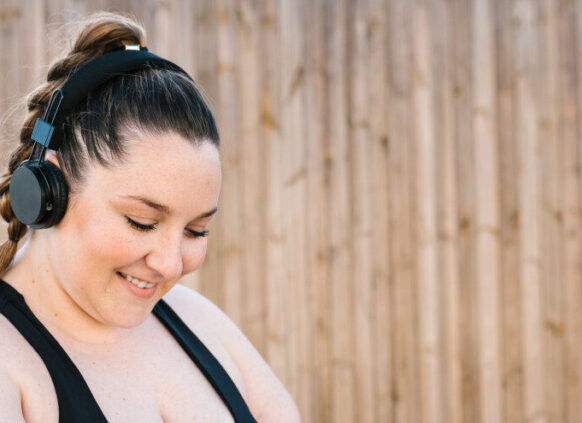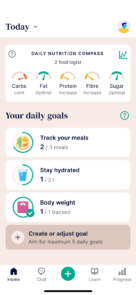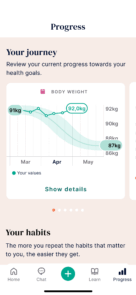
Healthy weight loss habits to add to your daily routine
If you’re living with obesity and trying to lose weight, you want to develop healthy habits. These can be formed through positive behaviours you add to your daily routine, which can be repeated until they become habitual. These behaviours should also be sustainable so you can use them for long-term weight management. In this article, we’ll explore some healthy behaviours you should focus on and less healthy habits you can try to break.
Oviva is a weight management service that provides access to weight loss medication and expert support in areas like diet, exercise and healthy habits to lose weight.
Key Takeaways
- Adopting healthy behaviours, such as attentive eating and using smaller plates, can reduce overall food intake and assist with weight loss efforts.
- Breaking existing habits that are unhelpful, like unhealthy snacking and distracted eating, can be equally crucial for managing your weight.
- Healthy habits can take time to form. Be kind to yourself when trying a new approach.
- It is important to focus on consistency and sustainable weight loss methods. The end goal should be long-term sustainable behaviour changes rather than quick fixes.
Healthy behaviours to aid your weight loss journey
There are several healthy behaviours you can adopt as part of your daily routine for weight loss, and some of these behaviours require relatively small changes.
For example, one simple step is to start tracking your food by creating a food journal or using a weight loss app. Set healthy behavioural goals, like adding more vegetables to your meals and track your daily food intake so you can monitor your progress.
Try to drink plenty of water throughout the day. This can have a small impact on your appetite, and even small improvements can quickly add up when you’re learning how to lose weight. You could have a glass when you first wake up and a glass before your main meals. Some people also benefit from using smaller plates, as this leads to smaller portion sizes.

In terms of dietary changes, it can be a good idea to increase the proportion of your meals that are made up of vegetables and to create meals that are nutritious rather than filled with ‘empty calories’. Try to eat breakfasts with complex carbs or protein. Eggs are a great source of protein, while oatmeal and whole grains can be good choices for complex carbs.
Meal planning and batch cooking can be useful tools in this regard, as can creating a food journal. The Oviva app makes it easier to track meals and activity levels. As you try to build new habits, it may be a good idea to follow a healthy diet plan initially and gain meal inspiration.
Try to move after your meals, ideally by going for a walk, and consider possible ways to address ‘emotional eating’ if it’s a problem for you. Emotional eating is eating in response to experiencing strong emotions. Speak to a healthcare professional about possible coping strategies and consider whether there may be ways to avoid triggers that cause this.
Habits that are less helpful for weight loss
Building healthy habits for weight loss is essential, but it’s equally important to try to break existing habits that are detrimental to your efforts.
For instance, a 2015 research report (Suzanne Higgs) highlights evidence that distracted eating correlates with an increase in later snack intake. This helps to highlight the value of cutting out screen time while eating and avoiding other similar distractions.
Some people build unhelpful habits concerning meal timing, going long periods without eating and then overeating due to increased feelings of hunger. Breaking this habit by spacing meals regularly throughout the day can help reduce overeating.
It’s also helpful to manage snacking. Keep some healthy snacks, like fruit and nuts, around the house and eat them in moderation so you don’t get too hungry. This can help avoid the temptation of reaching for unhealthy snacks.

Why behaviour change is key to weight loss
Within the context of weight loss, behaviour change refers to a conscious effort to alter your current lifestyle and make alterations to areas like nutrition and physical activity. Over time, positive behaviours can turn into weight loss and healthy habits.
There is a strong psychological component to behavioural change that needs to be considered. Motivation can fluctuate, so goal setting, clarity about what to do and support systems can all help you stick to a plan long enough to build habits for weight loss. You’ll also need to consider triggers and develop strategies for avoiding or managing them.
A 2017 study (Ryan R. Bailey) explores the relationship between health behaviour change and action planning. It suggests healthcare professionals can assist patients with lifestyle changes by encouraging goal setting and the creation of a plan of action. Working with healthcare professionals, you can outline specific steps you’ll take to achieve your goals.
The Oviva app can help you track meals, set goals, and monitor your mood. You can also speak with coaches who can help you develop the best diet for weight loss.
Setting challenging but realistic goals and creating an action plan can help with motivation by providing a target and breaking the task down into manageable steps that feel less daunting. Tracking your progress can also help you to understand your weight loss journey.

The programme has changed my outlook on life – I am excited to continue my journey to live a healthier and happier life.
The importance of building healthy habits
To achieve long-term weight loss and avoid putting weight back on you need to work on daily routines and behaviours that can become healthy habits.
This requires consistency, flexibility and perseverance. Small and sustainable behavioural changes can significantly impact your weight loss journey, especially when you combine multiple positive habits and challenge the less healthy ones. This can also help create the right conditions for making better food choices.
Acknowledging that habits are established over time is vital, and creating new habits is tough. Remember to try to be kind to yourself. Habit changes require patience and persistence, but each small step you take brings you closer to lasting change and a healthier, more balanced life.

Discover sustainable weight loss with Oviva
Oviva is a weight management programme that helps people with obesity build healthy weight loss habits and a sustainable weight management plan. Eligibility criteria typically include a BMI over 35 and at least one weight-related health condition.
You’ll have access to a coaching team that provides expert support in areas like nutrition, exercise, mental health, and the development of positive behaviours. This support is tailored to your specific needs. The Oviva app also provides tools for tracking your progress.








